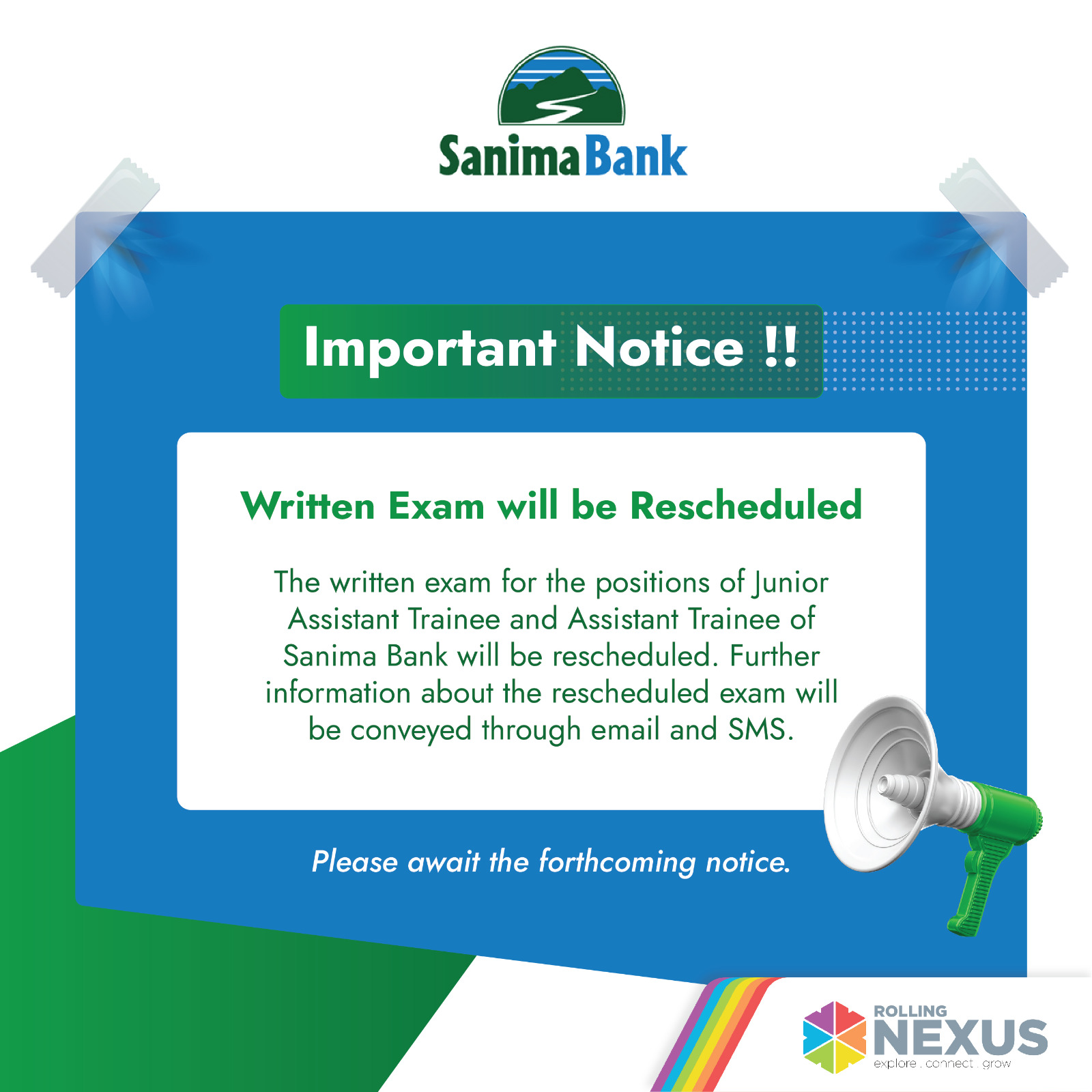How ‘ABLE’ are we?
"You are not weird, you are just limited edition."- Mr. Tara Pandey
Mr. Tara Pandey is the current Branch Manager of Global IME Bank Ltd., once shared during an event of Karmashil organized by Sukalpa International Pvt. Ltd., "We are not limited, we are limited edition." So, who are we? The people who are abandoned by this society in many ways or the people who are trying to fit in this society in every way. Yes, I’m talking about ‘The Persons with Disabilities.’ Wait! Let’s correct ourselves, it’s not the ‘The Persons with Disabilities' but the person who are ‘Differently Able’.
Differently abled persons are one of the most marginalized and excluded groups in society especially in developing countries like Nepal. They face daily discrimination not only in the form of negative attitudes and lack of adequate policies and regulations but also in the form of easily accessing their basic rights such as healthcare, education and, others. Being disabled by birth and being disabled at some point in life due to certain circumstances is completely different. When disability is by birth, a person can accept themselves the way they are but when it happens conditionally then it’s very hard to accept the fact that a person’s life has changed completely and it will affect their affection and acceptance how they have become. It is emotional and psychological pain rather than just physical.
We, society, never accept the fact that they should be treated normal and equally as able people. Let’s not blame society for not including them. If we see the changes our society is making so far, that’s huge. Starting from ‘Friendly’, we have transformed the places for them from “you can’t go there to let me help you a little.” The schools, hospitals, roads, buildings, public places and so on, from stairs to elevator, from toilets to accessible, from footpath to walking trails, from co-drivers to navigation tracker voice system, it has improved a lot. Many things have changed a lot in these years for the differently-abled persons, they used to advocate for their rights but now things are different. They are being supported and included in many actions equally. We might have heard thousands of speeches regarding disabilities and their struggle, we might have read hundreds of articles about their opportunities and involvement in various areas of work. This clearly shows humanity has not deceased, we are treating humans as a human.

However, we have only talked about physical accessibility for them so far though it’s more about the psychological and sensitive accessibilities they are looking for. The situation at present is not just to find where there are problems for people with disabilities but to see where there are not. There is no doubt that many persons with disabilities are talented and capable. The policy for the implementation of the provision of positive discrimination should be adopted to provide special priority to the people with disabilities in any type of employment that arise or are created in the country level. Needless to say, that a person’s capacity is strengthened when he/she is given adequate opportunities to participate in society. But the irony is that many persons with disabilities in developing countries live in an extremely unequal and restricting environment with limited personal capacity.
In developing countries like Nepal, many organizations are working for equal opportunities, participation, and empowerment and mainstreaming the disabled into society. But what is preventing differently-abled to get equal opportunities and success? Here’s a thing, no matter how hard an organization works for disabled to be treated equally as ordinary people, we, typical human beings, are unable to accept the fact that they are also one of us. There is and there always be a glass door for them. The persons with disabilities might be talented and capable of doing things as other normal people, but acceptance seems to be a cornerstone for providing career opportunities for people with disabilities. Accordingly, lack of knowledge about the impairments, mainly about the competences of people with disabilities, seems to be the strongest barrier for the acceptance of differently-abled people in the corporate world. Possible reasons for the denial of reasonable accommodations are concerns about costs, safety, fear of legal liability, or managerial biases.
Nevertheless, some employers are open to hiring people with disabilities. These employers are characterized by openness to diversity and the equal treatment of their employees regardless of health conditions. Furthermore, they support the competences of all employees instead of trying to avoid impairments. Some of such employers in Nepal are Sam’s One Tree Café, Bakery Café, Aloft Hotel, Brihaspati Bidhya Sadan School, and Sukalpa International Pvt. Ltd. There might be others too. Such companies are not just providing the opportunities, they are supporting differently-abled persons with mental and emotional accessibilities for their journey of career. What further remains is to fill in the gaps to fully understand the concept of acceptance and how it is related to the sustainable employment of people with disabilities.
Acceptance, empathy and humane behavior is not an inherent characteristic in human or any organization. Ever thought how these happen? The answer is our daily lifestyle, learnings and, observations from our childhood. Thus, change must start from the educational system, kids must be taught empathy and humane behavior right from their childhood. It’s not just about the ability of differently-abled people to accept themselves as they are and believe in themselves, it’s also about the ability of we, ordinary people, to accept and believe that differently-abled people can do better like us and than us in many cases if given right opportunities and support.
Author
Manila Devkota (Ms. Devkota is currently serving Rolling Plans Private Limited as a Senior Officer-Group HR)
Mr. Tara Pandey is the current Branch Manager of Global IME Bank Ltd., once shared during an event of Karmashil organized by Sukalpa International Pvt. Ltd., "We are not limited, we are limited edition." So, who are we? The people who are abandoned by this society in many ways or the people who are trying to fit in this society in every way. Yes, I’m talking about ‘The Persons with Disabilities.’ Wait! Let’s correct ourselves, it’s not the ‘The Persons with Disabilities' but the person who are ‘Differently Able’.
Differently abled persons are one of the most marginalized and excluded groups in society especially in developing countries like Nepal. They face daily discrimination not only in the form of negative attitudes and lack of adequate policies and regulations but also in the form of easily accessing their basic rights such as healthcare, education and, others. Being disabled by birth and being disabled at some point in life due to certain circumstances is completely different. When disability is by birth, a person can accept themselves the way they are but when it happens conditionally then it’s very hard to accept the fact that a person’s life has changed completely and it will affect their affection and acceptance how they have become. It is emotional and psychological pain rather than just physical.
We, society, never accept the fact that they should be treated normal and equally as able people. Let’s not blame society for not including them. If we see the changes our society is making so far, that’s huge. Starting from ‘Friendly’, we have transformed the places for them from “you can’t go there to let me help you a little.” The schools, hospitals, roads, buildings, public places and so on, from stairs to elevator, from toilets to accessible, from footpath to walking trails, from co-drivers to navigation tracker voice system, it has improved a lot. Many things have changed a lot in these years for the differently-abled persons, they used to advocate for their rights but now things are different. They are being supported and included in many actions equally. We might have heard thousands of speeches regarding disabilities and their struggle, we might have read hundreds of articles about their opportunities and involvement in various areas of work. This clearly shows humanity has not deceased, we are treating humans as a human.

However, we have only talked about physical accessibility for them so far though it’s more about the psychological and sensitive accessibilities they are looking for. The situation at present is not just to find where there are problems for people with disabilities but to see where there are not. There is no doubt that many persons with disabilities are talented and capable. The policy for the implementation of the provision of positive discrimination should be adopted to provide special priority to the people with disabilities in any type of employment that arise or are created in the country level. Needless to say, that a person’s capacity is strengthened when he/she is given adequate opportunities to participate in society. But the irony is that many persons with disabilities in developing countries live in an extremely unequal and restricting environment with limited personal capacity.
In developing countries like Nepal, many organizations are working for equal opportunities, participation, and empowerment and mainstreaming the disabled into society. But what is preventing differently-abled to get equal opportunities and success? Here’s a thing, no matter how hard an organization works for disabled to be treated equally as ordinary people, we, typical human beings, are unable to accept the fact that they are also one of us. There is and there always be a glass door for them. The persons with disabilities might be talented and capable of doing things as other normal people, but acceptance seems to be a cornerstone for providing career opportunities for people with disabilities. Accordingly, lack of knowledge about the impairments, mainly about the competences of people with disabilities, seems to be the strongest barrier for the acceptance of differently-abled people in the corporate world. Possible reasons for the denial of reasonable accommodations are concerns about costs, safety, fear of legal liability, or managerial biases.
Nevertheless, some employers are open to hiring people with disabilities. These employers are characterized by openness to diversity and the equal treatment of their employees regardless of health conditions. Furthermore, they support the competences of all employees instead of trying to avoid impairments. Some of such employers in Nepal are Sam’s One Tree Café, Bakery Café, Aloft Hotel, Brihaspati Bidhya Sadan School, and Sukalpa International Pvt. Ltd. There might be others too. Such companies are not just providing the opportunities, they are supporting differently-abled persons with mental and emotional accessibilities for their journey of career. What further remains is to fill in the gaps to fully understand the concept of acceptance and how it is related to the sustainable employment of people with disabilities.
Acceptance, empathy and humane behavior is not an inherent characteristic in human or any organization. Ever thought how these happen? The answer is our daily lifestyle, learnings and, observations from our childhood. Thus, change must start from the educational system, kids must be taught empathy and humane behavior right from their childhood. It’s not just about the ability of differently-abled people to accept themselves as they are and believe in themselves, it’s also about the ability of we, ordinary people, to accept and believe that differently-abled people can do better like us and than us in many cases if given right opportunities and support.
Author
Manila Devkota (Ms. Devkota is currently serving Rolling Plans Private Limited as a Senior Officer-Group HR)


